The International Monetary Fund (IMF) has released its report on global growth expectations for 2024, keeping its forecasts steady while highlighting risks of inflation and trade tensions. The IMF has cut growth projections for the United States and Japan while upgrading forecasts for China, India, and Europe. The world economy is expected to grow by 3.2 per cent this year and 3.3 per cent in 2025, according to the IMF, unchanged from its previous forecast in April.
The IMF’s World Economic Outlook update reveals that global progress against rising prices has been hindered by persistent inflation in the services sector, such as airline travel and restaurant meals. Despite steady global growth, the IMF’s chief economist, Pierre-Olivier Gourinchas, acknowledges that the current expansion falls short of historical standards, which averaged 3.8 per cent annually from 2000 to 2019 before the pandemic disrupted economic activity.
China and India are expected to drive nearly half of global growth in 2024, with China’s growth forecast upgraded to 5.0 per cent from earlier projections. However, challenges such as the housing market collapse and an ageing population may slow China’s growth to 3.3 per cent by 2029. India’s economy is projected to expand by 7.0 per cent, driven by increased consumer spending in rural areas.
The IMF notes signs of recovery in Europe, following economic damage caused by Russia’s attack on Ukraine in 2022. The eurozone’s growth forecast for 2024 has been raised to 0.9 per cent, reflecting improvements in services businesses. On the other hand, the IMF has revised its growth forecasts downwards for the United States and Japan due to weak first-quarter performances in both countries.
Despite a rapid post-pandemic recovery, inflation is expected to ease globally from 6.7 per cent in 2023 to 5.9 per cent in 2024 and 4.4 per cent in 2025. However, the IMF warns that services inflation remains a challenge, leading some central banks to maintain higher interest rates to control inflation. This could potentially weaken global growth if borrowing costs unexpectedly rise.
In summary, the IMF’s report underscores the importance of managing inflation risks and addressing trade tensions to sustain global economic growth. While some regions like China, India, and Europe show promising growth prospects, challenges such as persisting inflation and labor shortages may dampen economic performance in the coming years. Policymakers are advised to closely monitor these factors to ensure sustained economic stability and poverty reduction worldwide.











